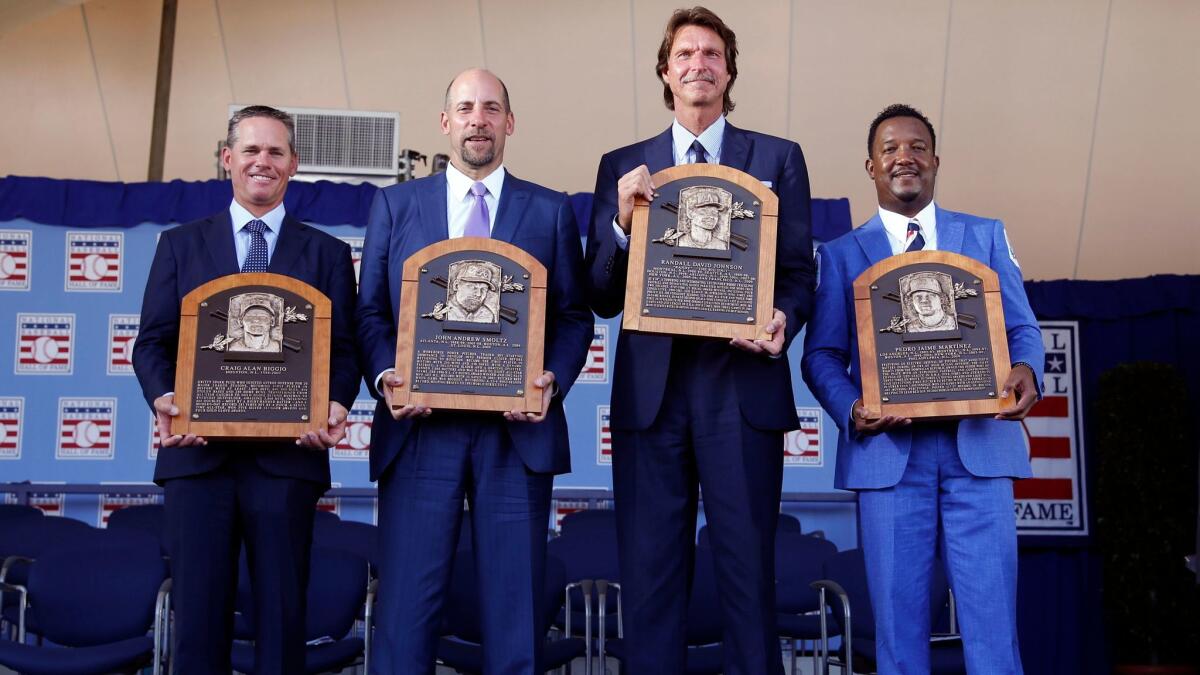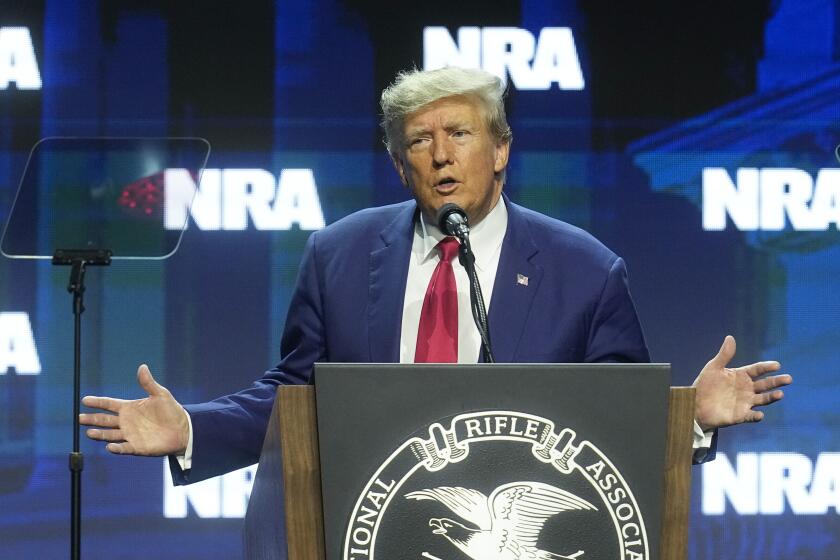Op-Ed: What the baseball hall of fame can teach us about elections

Would ballot-box behavior change if people knew more precisely how their fellow citizens planned to vote?
It’s a question that no doubt still haunts Democrats as they continue staring daggers at their friends who went third-party in November 2016. But it’s also an experiment being carried out in real time by the Baseball Writers Assn. of America (BBWAA), as members prepare to elect at least three and as many as five retired greats to the Hall of Fame later this month.
BBWAA’s complicated voting rules work like this: Eligible players need 75% of the vote to win election. Those receiving less than 5% get kicked off the ballot; those between rejection and enshrinement can stay on the ballot for a maximum of 10 years. And voters can support a maximum 10 candidates.
Like our political system, the BBWAA allows for early voting. But unlike our elections, writers can get a pretty accurate idea of vote tallies long before the deadline, and adjust their selections accordingly.
Why is it that we know who baseball writers vote into a museum, but not who political journalists and commentators vote into office?
“My voting theory is changing a bit,” Sporting News’ Ryan Fagan confessed last month. “I’m voting for the players who need the votes the most, based on current totals and trends. Ryan Thibodaux’s Hall of Fame tracker is essential for this approach.”
Thibodaux, a 36-year-old fan from Oakland, has over the past several years compiled a meticulous, constantly updated voter database based on public ballots.
Many writers grumble at the heightened scrutiny, as passionate fans bombard them with jargon-heavy statistical analyses and colorful insults. “Why not get a few more weeks of peace before I learn from the Twitterati why I’m an idiot who should have his voting privileges revoked?” groused the San Francisco Chronicle’s Henry Schulman last month.
But the exposure to outside arguments has undeniably changed minds. Tim Raines last year, Bert Blyleven in 2011, and perhaps Edgar Martinez this year all benefited from sustained public campaigns by persuasive nonvoters.
Thibodaux’s tracker helps the electorate see if a potentially worthy candidate is in danger of falling off the ballot (as Andruw Jones is this year), or whether someone is sailing so high above the 75% bar that a vote can safely be applied elsewhere.
“I’m now thinking I should have taken a more strategic approach, and withheld a vote for a lock such as Chipper Jones to ensure Andruw remained on the ballot,” complained Fox Sports’ Ken Rosenthal recently.
Out here in the real world, we obviously don’t have multiple-choice ballots, pre-election vote tabulations, or all-powerful guilds controlling the franchise. But there are methods available for making the voting process more transparent and tethered to the electorate’s intentions.
One is ranked-choice voting, whereby voters write down their preferred candidates in order, thus potentially insulating their heart with their brain (or vice-versa). Under this system, winners have to receive a majority of the votes, and until that 50% line is crossed, last-place finishers are crossed out one by one, with their votes redistributed to their supporters’ second choices, and third if need be. It’s the law of the land in Maine (by ballot initiative), though the two major parties have thus far blocked enactment.
Ranked choice applied to, say, Michigan in 2016, may well have produced a different outcome. Donald Trump eked out a 47.50-47.27% win over Hillary Clinton. But if votes for Emidio Soltysik (0.05%), Evan McMullin (0.17%), Darrell Castle (0.33%), Jill Stein (1.07%) and Gary Johnson (3.59%) had been redistributed to second-choice picks, the state may well have flipped blue. Exit polls showed both Johnson and Stein voters having small preferences for Clinton over Trump.
That of course is not a good reason in itself to support ranked choice; the point is to better express voter will, whatever that may be. And NeverTrumpers should be aware that — hard as it may be to accept! — when given the theoretical opportunity for a do-over last year, American voters in a Washington Post/ABC News poll actually reelected the bogeyman, with Clinton losing even more support to third-party candidates.
While ranked-choice fights it out in Maine and elsewhere, the rest of us can start applying one key lesson from baseball’s Hall of Fame balloting: Transparency can lead to clarifying arguments. Given the comparative stakes, why is it that we know who baseball writers vote into a museum, but not who political journalists and commentators vote into office?
Those of us who yammer about politics all day could benefit from the discipline of defending our real-world choices.
Matt Welch is editor at large of Reason and a contributing writer to Opinion.
Follow the Opinion section on Twitter @latimesopinion or Facebook
More to Read
A cure for the common opinion
Get thought-provoking perspectives with our weekly newsletter.
You may occasionally receive promotional content from the Los Angeles Times.










